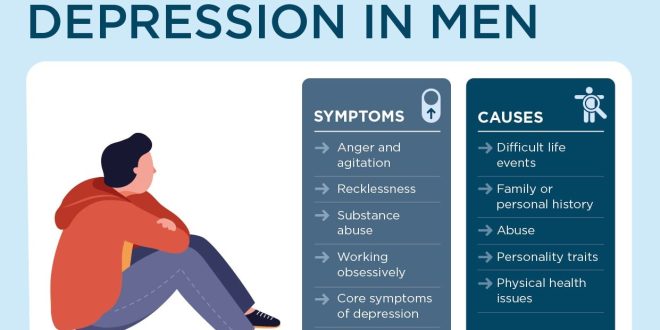Major depressive illness (also known as Melancholy) can be a serious medical condition that can negatively affect your mood, conduct, and wondering. It can be treated. Depression can cause sadness and a loss of interest in sports that you once loved. Depression can cause a variety of emotional and physical problems that could affect your ability to work at home and at painting.
Melancholy symptoms can range from mild to severe.
Other symptoms of depression could include:
- Feeling depressed or unhappy.
- Loss of interest in the sports you once enjoyed
- Weight loss or increased appetite is not associated with the weight reduction plan.
- Sleeping difficulties (either an excessive amount or too little).
- Increased fatigue and loss of electricity
- Slow or agitated actions
- Emotions of responsibility or lack thereof
- Concentration or selection difficulties
- Suicide or death thoughts
A melancholy prognosis requires that you exchange your previous stage. It lasts at least two weeks and has signs and symptoms for more than one day. It is important to rule out any other scientific conditions, such as thyroid problems or vitamin deficiencies that could mimic depressive symptoms.
Sixteen.6% (or one in six) people will experience despair at some point in their lives. Depression can strike at any age. However, the most common age for onset is between the teen years and the mid-20s. Depression is more common among girls than in men. 1/3 of girls have experienced depression at least once in their lives. There is a 40% chance of despair in first-degree families.
Depression is not the same thing as sadness or grief
One can enjoy difficult times in their lives. This could include losing someone you love, losing a job, or ending a relationship. It’s common to feel sadness or grief in these situations. People who have suffered loss may refer to themselves as “depressed.”
While grief can take many forms, it has many similarities to depression. Depression and grief can cause severe withdrawal and unhappiness. However, sadness is different from being depressed. Grief is more specific than melancholy.
The waves of grief can bring up difficult emotions. These emotions can be mixed with wonderful memories of the deceased. Sadness can lead to a decrease in joy or a lower mood for as long as two weeks.
In general, grief does not affect one’s self-esteem. Unhappiness can cause feelings of worthlessness, self-loathing or even suicide.
It may lead to thoughts of death and “becoming” a relative of the recently deceased. Overthinking of Depression is the act of ending one’s life because they feel unworthy or unable to deal with the pain.
Sometimes, depression and grief can coexist. Some people may experience despair after experiencing loss. A combination of grief and despair can lead to more severe symptoms and signs than if the grief were experienced individually.
It’s important to distinguish between grief and depression, as it would help people get the right support and treatment.
Depression Risk Factors
Depression can strike anyone, even those who seem to have the perfect lifestyle and all of it together.
Depression can be caused by a variety of factors:
Biochemistry:
Depressive symptoms can also be caused by the presence of positive chemical substances within our brains.
Genetics:
Depression is a result of genetic factors. If one of the duals is diagnosed with depression, there is a 70% chance that the other dual could also have the condition.
Personality:
People with low levels of shallowness, who are easily overwhelmed or pessimistic, are more likely to be depressed.
Environmental Factors:
People who live in environments that are constantly exposed to violence, abuse or neglect can be more vulnerable to melancholy.
How can despair be treated?
Depression is the most difficult intellectual problem. Nearly everyone with melancholy has experienced some relief. Treatment is successful for between 80% and 90% percent of patients suffering from despair.
Before making any analysis, a licensed expert like a psychologist must conduct a detailed diagnostic assessment. An evaluation can be done by a psychologist, or another certified mental fitness expert. A comprehensive assessment will look at your unique symptoms and family history. It will also help you to develop a treatment plan. A primary care physician should conduct a physical examination to rule out other medical conditions that could cause depression, such as thyroid problems, nutritional deficiencies, or other clinical conditions.
Medication:
Depressive symptoms may also be influenced by brain chemistry. This function can be addressed with remedies like or Fildena . Antidepressants may be prescribed by a psychiatrist or a PCP to modify brain chemistry. While antidepressants may provide some relief within the first few days of treatment, it is possible to see full results over time. Patients may also feel little or no improvement after several weeks.
It is important to notify your doctor or psychiatrist if your medication isn’t working or causing side effects. Your psychiatrist or doctor can alter the dose or replace the antidepressant.
Psychotherapy:
Depression can be treated with psychotherapy, also known as communication remedy. Talk therapy can be used alone for mild depression. Talk therapy may be required for moderate to severe melancholy. Cognitive Behavioral Therapy (CBT), a treatment modality that therapists use to treat melancholy, is called Cognitive Behavioral Therapy.
CBT doesn’t recognize the past. Instead, it specializes in problem-fixing at the gift moment. CBT helps people recognize cognitive distortions that are contributing to the modern nation. They can identify and correct bad or distorted questions that could negatively impact their moods, behavior, and actions. It is possible for the duration of treatment to be affected by severity. The remedy might last several weeks or even longer depending on how severe your symptoms are. Large development usually occurs in 10 to 15 periods.
Electroconvulsive Therapy, (ECT):
People with severe depression and who have not responded to other treatments are good candidates for ECT. This scientific method was usually managed by a crew that included a psychiatrist, anesthesiologist and nurse/doctor assistant. ECT was the last hotel in psychiatry during the Nineteen Fortys. ECT has made great strides over the years. ECT is now a well-respected treatment option for severe and persistent depression.
Coping and self-help
Human beings have many options to reduce the severity of depression. It is a good idea to build a solid foundation that includes nutrition, exercise, and sleep. Regular exercise is a great way to improve your mood and create a positive feeling. Mental health can be improved by getting 7-9 hours of sleep each night and drinking less alcohol.
Reach out to a psychiatrist, certified medical psychologist or other mental health professional if you feel depressed. With proper diagnosis and treatment, depression can be treated. Asking for help is the hardest step.
 Naa Songs
Naa Songs




